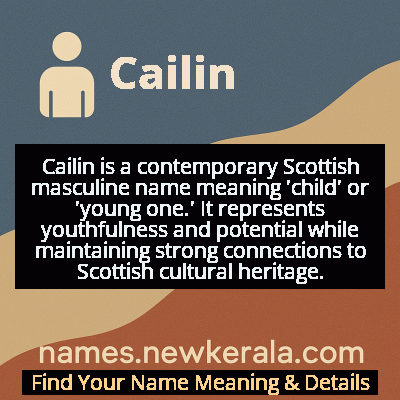Cailin Name Meaning & Details
Origin, Popularity, Numerology Analysis & Name Meaning of Cailin
Discover the origin, meaning, and cultural significance of the name CAILIN. Delve into its historical roots and explore the lasting impact it has had on communities and traditions.
Name
Cailin
Gender
Male
Origin
Scottish
Lucky Number
3
Meaning of the Name - Cailin
Cailin is a contemporary Scottish masculine name meaning 'child' or 'young one.' It represents youthfulness and potential while maintaining strong connections to Scottish cultural heritage.
Cailin - Complete Numerology Analysis
Your Numerology Number
Based on Pythagorean Numerology System
Ruling Planet
Jupiter
Positive Nature
Optimistic, inspirational, and creative.
Negative Traits
Scattered, exaggerating.
Lucky Colours
Yellow, gold, purple.
Lucky Days
Thursday.
Lucky Stones
Yellow sapphire.
Harmony Numbers
1, 2, 9.
Best Suited Professions
Arts, writing, communication.
What People Like About You
Creativity, optimism.
Famous People Named Cailin
Cailin Russo
Model and Musician
International fashion model and recording artist
Cailin O'Connor
Academic Researcher
Philosophy professor and author specializing in evolutionary game theory
Cailin Loesch
Journalist
Award-winning writer and digital content producer
Name Variations & International Equivalents
Click on blue names to explore their detailed meanings. Gray names with will be available soon.
Cultural & Historical Significance
The name's cultural significance extends beyond mere nomenclature, representing Scotland's complex relationship with its Gaelic past and its position in the modern world. As Scotland has navigated political and cultural changes over centuries, names like Cailin have served as markers of identity and continuity. The adaptation from traditional 'Cailean' to contemporary 'Cailin' demonstrates how Scottish culture maintains its distinct character while engaging with broader global influences. This name embodies the Scottish virtues of resilience, loyalty, and practicality while also reflecting the nation's ongoing cultural renaissance and renewed interest in Gaelic heritage.
Extended Personality Analysis
Individuals named Cailin are often perceived as possessing a unique blend of traditional values and modern adaptability. They typically exhibit strong leadership qualities combined with emotional intelligence, making them natural mediators and team builders. The name suggests someone who is both grounded in their heritage and open to new experiences, displaying courage in facing challenges while maintaining a compassionate approach to interpersonal relationships. This combination of strength and sensitivity often makes Cailins effective in roles requiring both determination and diplomacy.
Their personality tends to reflect the Scottish cultural values of resilience, loyalty, and practicality, while also embracing contemporary ideals of innovation and global awareness. This duality allows them to navigate diverse social and professional environments with equal ease, often serving as bridges between traditional and modern perspectives. Cailins are frequently described as dependable yet adventurous, conservative in their core values but progressive in their thinking. They typically demonstrate a strong sense of responsibility toward family and community, coupled with an independent spirit that drives them to pursue their unique path. The name suggests a person who honors tradition without being constrained by it, someone who respects the past while actively shaping the future.
Modern Usage & Popularity
In contemporary usage, Cailin has emerged as a distinctive masculine name that honors Scottish heritage while fitting seamlessly into global naming trends. While not among the most common names, it has seen steady usage in Scotland and among Scottish diaspora communities worldwide. The name's popularity reflects a broader trend of reviving and modernizing traditional Celtic names, particularly among parents seeking names that are both culturally significant and phonetically accessible to English speakers. Recent years have shown increased interest in Cailin as part of the movement toward unique yet meaningful names that bridge cultural tradition and modern individuality. Its usage spans across English-speaking countries, with particular concentration in Scotland, Northern Ireland, Canada, and the United States, where it appeals to parents wanting a name that is distinctive without being overly exotic or difficult to pronounce.
Symbolic & Spiritual Meanings
Symbolically, Cailin represents the bridge between youth and maturity, tradition and innovation. The name carries connotations of growth and potential, embodying the idea of a young warrior or leader in development. It symbolizes the preservation of cultural roots while embracing contemporary evolution, much like Scotland itself maintains its distinct identity within a modern global context. The name suggests resilience and adaptability—qualities historically associated with Scottish culture—while also representing the nurturing aspect of leadership and the continuous process of personal and cultural renewal. This symbolic richness makes Cailin not just a personal identifier but a representation of cultural continuity and individual potential, embodying the idea that true strength comes from understanding one's origins while courageously moving forward.

